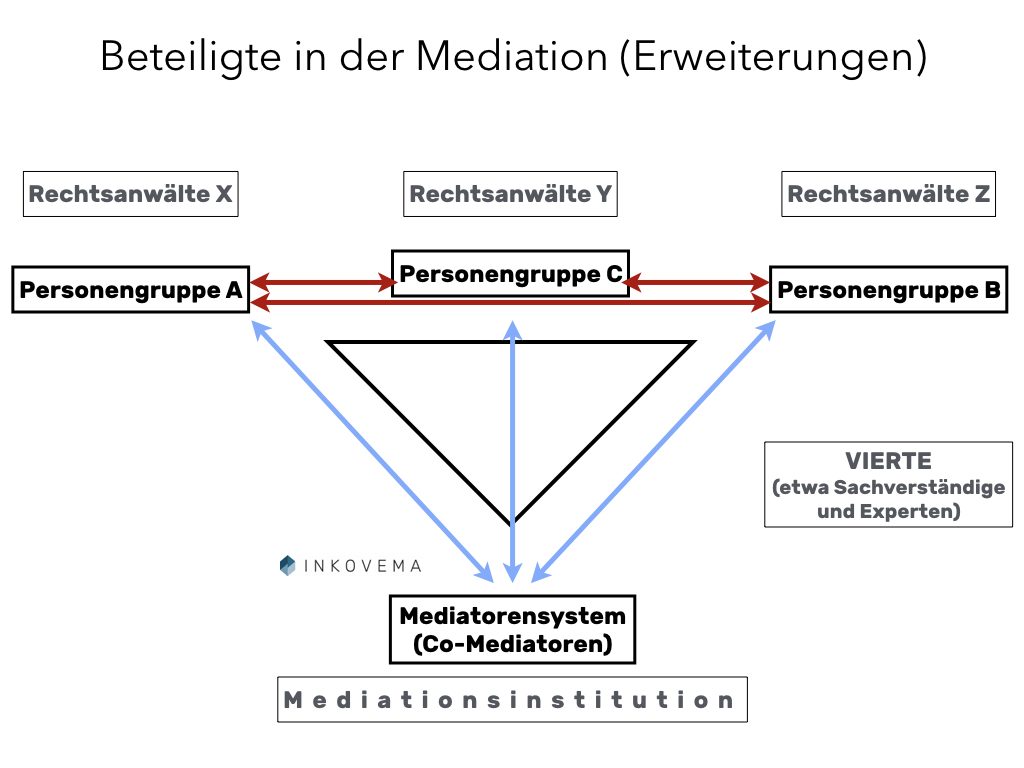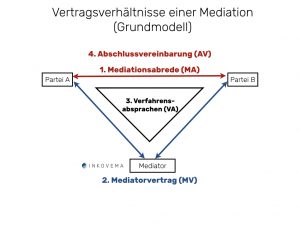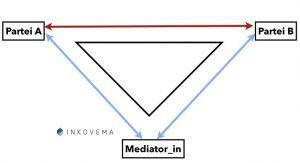Contractual foundations of mediation
25 Basics of mediation (22)
Parties to a conflict endeavour to clarify their social relationships. In mediation, they use arrangements, agreements and understandings in order to (re)harmonise. tolerate. In short and in legal terms: you conclude Contracts. And usually not in short supply. This regularly results in veritable contractual networks. This is exactly what today's article deWe'll be weaving together the individual contracts, naming them, clarifying their essential content and shedding light on the principles of contract law. So it will be legal, but not at all boring. Quite the opposite.
The contractual framework of mediation depends on three influencing factors:
- the specific parties involved (contractual partners, mediants, participants),
- the specific agreements between the parties involved (contractual network) and
- the legal framework conditions to contractual agreements. (Contractual principles)
1. parties involved in mediation
The parties involved can be the parties to the conflict or contract, the mediator as a third party and other parties who are called in for various reasons to provide support and advice. The basic model of mediation corresponds to a triangular relationship.
The Basic model of mediation consists of at least three participants:
Extensions
- In more extensive mediation proceedings, the basic model must be expanded. If, for example Social systems, i.e. teams and organisations the parties to the conflict, they must send specific people to mediation. Sometimes it is necessary to send several people from a social system to mediation for a single conflict party (e.g. entire families in neighbourhood conflicts).
- However, it is also possible that the basic model is expanding because it is a Multi-party conflict are involved. For example, various citizens' groups, consumer protection associations, interest groups or neighbourhood families.
- If there are many parties to the conflict at the mediation table, it can become somewhat confusing. It is therefore worthwhile – and often necessary „for the mediating third party “ to consist of several people – and a whole Mediation team the conflict.
- However, the triangle as such can also expand. It is not uncommon for those present to be simply overwhelmed and in need of expert advice, so that Party counsellorThe parties to the dispute may need to consult lawyers, tax advisors or other specialist advisors. However, there are also necessities, independent experts, to a certain extent Fourth to be consulted.
Unfortunately, the details of all this cannot take up space here. But feel free to ask questions or make comments in the comments section.
Finally, here is a general overview of the (possible) parties involved in mediation.

2. in the web of mediation agreements
In the basic model of mediation alone, there are regularly four different contractual relationships. Linguistically, they are all Mediation contracts or Mediation agreements.
- The mediation agreement
- The mediator contract
- The final agreement
- Procedural agreements

Photo by Anastasia Zhenina on Unsplash
-
The mediation agreement
In the mediation agreement, the parties to the conflict (not the mediator!) agree that they want to conduct a mediation procedure to resolve their current conflict. This basic agreement is sometimes also referred to as Mediation agreement in the narrow sense (in the narrower sense).
Only if there is the necessary intention to be legally bound (more on this under 3. below) and it is therefore not a mere declaration of intent, does the mediation agreement establish concrete legal obligations. Procedural support and negotiation obligations:
- Obligation to allow the start of mediation to be scheduled
- Obligation to participate in the selection of the mediator
- Obligation to make a pro rata advance payment
- Duty to negotiate in the first mediation session
- Duty to tell the truth with regard to the facts presented
However, the obligations to negotiate remain limited. In order to fulfil the duty to negotiate in the first session, it is sufficient for the party to the conflict to speaks. It exists no further obligation to negotiate and certainly no obligation to reach an agreement.
The mediation agreement also often includes the obligation to resolve the conflict by not immediately or in parallel in court. However, this does not always apply! Especially in the case of short preclusive periods in court, such a so-called "preclusion period" is not always possible. Dilatory waiver of claim rather the exception. This is the case in labour law, for example, as dismissals must be brought before a court within a short period of time in order to be able to take legal action against them.
Mediation agreements can either be reached after the conflict has already occurred. These would be so-called ad hoc agreements. Or they are used as Mediation clauses just in case in advance included in the contracts.
A simple mediation clause could read as follows, for example:
"In the event of differences of opinion regarding rights and obligations arising from this contract or disruptions in its implementation [lawyers usually formulate this very precisely ;-)], the contracting parties agree, before to seek an amicable solution by way of mediation before initiating legal proceedings."
(To Mediation clauses in private law contracts see also our detailed article here)
-
The mediator contract
The mediator contract is the central working basis for the mediator.
The mediator contract regulates the relationship between the parties to the conflict and the mediator (and, if applicable, the co-mediator). Legally, this is a Service contract within the meaning of § 611 BGB. In contrast to the contract for work and services, the mediator thus owes No successful mediation.
For the mediator, the mediation contract is the central working basis, the centrepiece of his assignment. The contract between the parties should therefore be formulated carefully and clearly. On the one hand, all essential points should be set out in it. This applies, for example, to the naming of specific performance rights and obligations. On the other hand, it should be avoided that the mediator is overly restricted in his work by over-regulation.
In practice, it is not uncommon for the (ad hoc) mediation agreement and the mediator agreement to be formulated together in a written contractual document. However, this does not change the fact that these are two different contracts with different contracting parties in each case. The colours in the overview above indicate these different contractual relationships and contents.
-
The final agreement
In the actual "crowning act" of mediation, the final agreement, the mediator is usually not even a party to the contract. With this agreement, the parties announce that the Conflict (at least partially) enclosed is. The final agreement normally affects the conflict in both a material and procedural way.
Material the parties conclude a contract within the meaning of § 311 BGB (German Civil Code), which is often to be categorised as a settlement pursuant to § 779 BGB.
In procedural terms both the mediation procedure and any (arbitration) court proceedings are regularly declared terminated with the final agreement.
In principle, the mediator is not a party to the final agreement. However, this does not mean that he can sit back and relax at this point. Quite the opposite: the role and task of the mediator is of great importance in the conclusion, and the corresponding duties are now standardised by law.
Which Difficulties can sometimes occur in this context
- especially with regard to the Limits of the Legal Services Act -
is organised by us in a further contribution treated.
-
Procedural agreements
During the mediation process, agreements and (verbal) arrangements are repeatedly made that concretise the nature of the cooperation during the process. One Continuous contract work is a permanent and legally effective instrument of the mediator, even if it is not always easy to prove afterwards.

3. principles of contract law
Mediation agreements are Contracts in the legal sense to be categorised as such. As such, they are also subject to legal logic. Whether an agreement is effective is therefore always a legal question.
Freedom of contract
The freedom of contract that generally applies to mediation gives the parties involved a Great creative freedom. It is up to you to decide whether mediation takes place and how it should be carried out. Neither contract law nor the Mediation Act prescribes a specific type or form of mediation. The legal requirements and limitations are rather narrow.
Mandatory right
The freedom to organise only reaches its limits where Boundarieswhere mediation agreements affect other legal interests that are valued more highly by the law than freedom of contract. Such mandatory law can be found above all in the German Mediation Act (MediationsG) and the German Civil Code (BGB). Certain rules from procedural law (ZPO) also apply to procedural agreements.
Examples of mandatory law:
-
- §§ 104 ff. BGB: e.g. no effective mediation contract is concluded if the mediator is legally incapable.
- § SECTION 138 BGB: Mediation agreements must not constitute usurious transactions or offend common decency.
- § Section 1 Mediation Act: The mediation contract cannot stipulate that the mediation should be unstructured.
Dispositive law
In contrast to mandatory, i.e. indispensable law, the so-called dispositive law is amendable law. Dispositive legal norms only apply if the parties have not made or intended any agreements to the contrary.
Example of dispositive law:
-
- Although the confidentiality of mediation is mentioned in Section 1 Mediation Act, it can be waived by the parties. They may conduct public mediation. This allows them freedom of contract. However, if they do not make an express agreement, the Mediation Act with its confidentiality requirement comes into play. (However, if one party does not behave confidentially but discloses information, e.g. on the website – and the other party calmly takes note of this, this may constitute an implied agreement for non-confidential mediation… contracts do not generally need to be in writing, but only two matching expressions of intent…)
Will to be legally bound – or the thing with the wine.
Not everything that looks like an agreement also contains a legal contract. There can also be non-binding agreements ("gentlemen's agreements") or mere declarations of intent and courtesies. In order to distinguish such legally non-binding but socially binding statements from "genuine" legally binding agreements, one must refer to the so-called "Will to be legally bound" pay attention. Among lawyers, the RBW, as it is sometimes called, enjoys almost mythical significance – and every lawyer thinks of WEIN in order to somehow keep his head above water in the thicket of legal considerations. To make a long story short: RBW is used to talk about the will of a person, but what is meant is how a third party could understand the act. (If you want, you can google: Rechtsbindungswille + Wein).
Contractual obligations, contractual rights
Mediation agreements establish rights and obligations. They lead to specific performance rights and performance obligations. One man's debt is another man's claim.
- Guilt is the obligation to perform, the obligation under the law of obligations.
- a Claim is the right to demand an act or omission from the other party, the debtor, § 194 BGB. (P.S.: The claim is a German invention by B. Windscheit – and was thus recognised and imitated throughout the world).
A distinction is made between the following obligations Primary, secondary and ancillary obligations. Claims are divided into Primary and secondary claims:
- The duty to mediate in a conflict as a mediator is, for example, a Main performanceduty. After all, mediating the conflict is the actual reason for appointing a mediator. On the other hand Ancillary servicesThey support and promote the value proposition. With good coffee and delicious biscuits, for example.
Besidesobligations are, as the name suggests, not performance-related. They are duties of consideration, protection and behaviour that must be taken into account as soon as the contractual negotiations begin. The mediator's dog should therefore not bite anyone, otherwise the mediator may also be liable under contractual obligations. - Primary claims arise from the mediation agreements themselves, while secondary claims arise from the breach of primary obligations.
However, mediators do not need to familiarise themselves with these legal contract principles in detail. Mediation does not require a law degree. The basics are perfectly adequate, but are sometimes necessary. We hope that this article has provided some clarity in this regard. If you have any further practical questions, please feel free to ask them in the comments! We will endeavour to reply as soon as possible.




The Trier wine auction is really exciting and vivid, understandable even for legal laymen;-)
When you've been out of law for so long, you have to keep your head above water with the absolute basics ;-)